Truthdiggers of the Week: Cuban Medical Workers Fighting Ebola
When the deadly international health crisis is over, the world will be morally indebted to a tiny island nation that has suffered economic attack from the U.S. for more than half a century.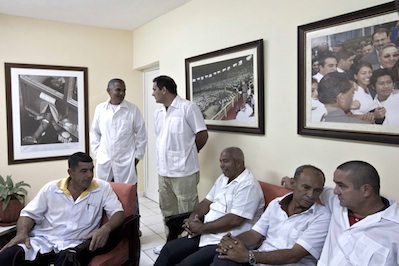
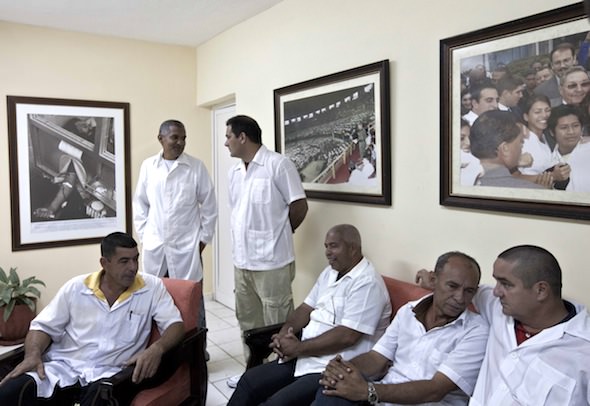
Cuban doctors await travel to Liberia and Guinea in mid-October. AP/Franklin Reyes
Every week the Truthdig editorial staff selects a Truthdigger of the Week, a group or person worthy of recognition for speaking truth to power, breaking the story or blowing the whistle. It is not a lifetime achievement award. Rather, we’re looking for newsmakers whose actions in a given week are worth celebrating.
The phrase “generosity of nations” is unlikely to appear in textbooks assigned to American political science and economics students. Nonetheless, the concept is visible in action in certain parts of the globe — perhaps most inspiringly in the countries of Sierra Leone, Guinea and Liberia in West Africa, where the Cuban government has defined itself as a world leader by providing hundreds of doctors and health workers to combat the raging, deadly Ebola virus.
As of mid-November, the tiny island state with a population of 11 million and an economy valued at slightly more than that of Belarus has provided more health care workers in the battle against Ebola than any other nation. That’s 256 doctors and nurses with an additional 200 professionals on their way. By comparison, the U.S. sent 3,000 military troops, none of them providing medical assistance, but instead focusing primarily on building treatment centers. It also pledged $400 million in aid. An article in The Wall Street Journal noted that “nations with some of the world’s most advanced health-care systems have come too late with too little to the crisis, said leaders from Ebola-affected countries.” China and India were reported to have contributed an “underwhelming” $5 million and $13 million, respectively.
Officials put the number of deaths caused by Ebola at over 4,000, but experts say the actual figure is twice as high. U.N. Secretary-General Ban Ki-moon said ending the outbreak would require “at least a 20-fold surge in assistance.”
It is clear that money alone will not solve the problem. In mid-September, the World Health Organization issued a desperate plea for medical staff and supplies to resolve the outbreak. “Our response is running short on nearly everything from personal protective equipment to bodybags, mobile laboratories and isolation wards,” said Director-General Margaret Chan, calling for 500 to 600 foreign doctors, and at least 1,000 additional staffers. “But the thing we need most of all is people: healthcare workers. The right people, the right specialists — and specialists who are appropriately trained and know how to keep themselves safe — are most important for stopping the transmission of Ebola.” The WHO reported that all members of the first contingent of Cuban workers had more than 15 years worth of experience and had worked in other countries facing natural disasters and the outbreak of disease.
For a new generation of observers, the Ebola response is helping Cuba make a name for itself as a force for global good. And the reputation is deserved. The WHO reports there are currently more than 50,000 Cuban-trained health care workers in 66 countries. By 2008 it was training 20,000 foreigners a year to be doctors, nurses and dentists, largely free of charge. The generous export is a function of the country’s publicly funded universal health care system, which was established by the Communist regime shortly after it overthrew U.S.-backed Fulgencio Batista in 1959 and enshrined as a human right in its 1976 constitution.
The country has consistently extended this policy beyond its borders to other nations in need. Its medical missions began with a provision of aid to Chile after an earthquake in 1960. In the 1970s and ’80s it offered wartime assistance to South Africa, Algeria, Zaire, Congo and Ghana. More recently, Cuban doctors went to Sri Lanka after the 2004 tsunami and treated victims of the 2005 earthquake in Pakistan and the 2010 quake in Haiti. In 2013, Cuba sent 4,000 doctors to remote rural areas of Brazil. The government offered assistance to the U.S. in the aftermath of Hurricane Katrina in 2005, but the offer was apparently rejected.
Cuba’s medical tradition was partly inspired by Che Guevara, the Argentine physician-turned-revolutionary who helped foment the Communist uprising. The medical workers have been nicknamed the “ejército de batas blancas” — the “army of white coats.” The contingent in West Africa is known as The Henry Reeve Brigade. It was founded in 2005 and named after a Cuban soldier in the country’s first war of independence. The doctors take their mission seriously. A wall in Cuba’s most prestigious medical school, the Escuela Latinoamericana de Medicina, bears a quote by dictator Fidel Castro: “This will be a battle of solidarity against selfishness.” The workers are reported to be eager to risk their lives for what they regard as an obligation to people everywhere. Before departing for Liberia, 63-year-old doctor Leonardo Fernandez expressed resolve in the face of danger and uncertainty in an interview with Reuters. “We know that we are fighting against something that we don’t totally understand,” he is quoted as saying. “But it is our duty. That’s how we’ve been educated.”
And the doctors are suffering too. While consultants from the U.S. Centers for Disease Control and Prevention enjoy the comfortable lodgings of a more than $200 a night resort, The Wall Street Journal reported, the Cuban medics “are living three to a room in one of Freetown’s budget hotels. The hotel’s toilets are broken. Flies buzz around soiled tablecloths where the Cubans eat in cafeteria-style shifts.”
Cuba’s efforts have received some praise from the U.S., which has maintained a destructive trade embargo against the island since 1960. U.S. Secretary of State John Kerry praised the country for its work. And U.S. Ambassador to the U.N. Samantha Power was “very grateful” to Cuba for its response. There was no question about working alongside the U.S. in the effort. “Against Ebola, we can work with anyone,” said Dr. Jorge Juan Delgado Bustillo, who has led Cuba’s response in West Africa. “The United States? Yes, we can.” In the state newspaper Granma, Fidel Castro wrote that he would be happy to put aside the country’s political differences to help nations afflicted with the virus. U.S. officials eventually confirmed they were willing to cooperate with Havana and the rest of the international community through organizations such as the WHO.
A tiny nation excluded from so many of the benefits of global trade is leading the humanitarian response to the Ebola outbreak. Cubans have every reason to glow with pride as their doctors and nurses undertake the grim work of attending the health of people of other countries that have been degraded by economic and often military aggression. Cuba’s officials and health care workers are our Truthdiggers of the Week.
Independent journalism is under threat and overshadowed by heavily funded mainstream media.
You can help level the playing field. Become a member.
Your tax-deductible contribution keeps us digging beneath the headlines to give you thought-provoking, investigative reporting and analysis that unearths what's really happening- without compromise.
Give today to support our courageous, independent journalists.
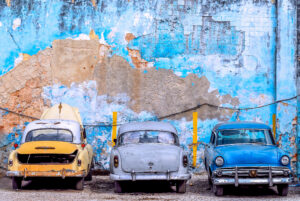
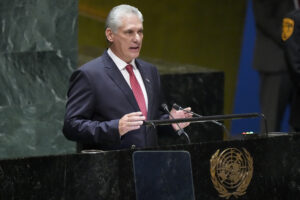
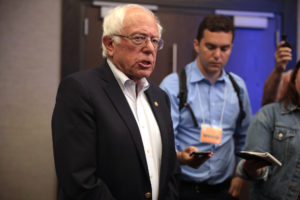
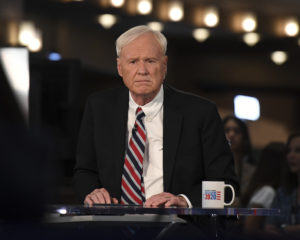
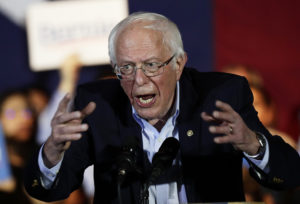
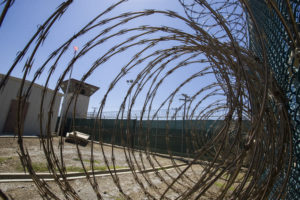
You need to be a supporter to comment.
There are currently no responses to this article.
Be the first to respond.